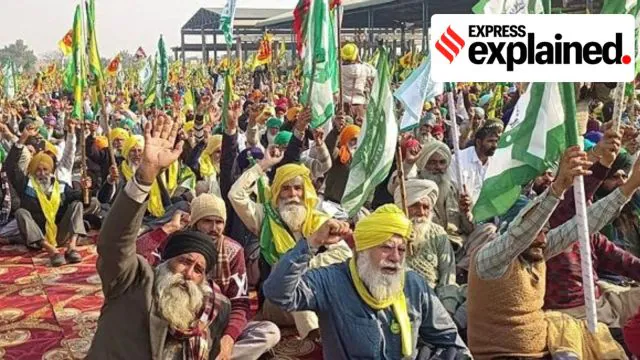Tags
Why protesting farmers in Punjab want India to withdraw from WTO.
According to the protesting farmers, the World Trade Organization’s (WTO) Agreement on Agriculture (AoA), implemented to reduce agricultural subsidies and establish fairer trade systems, is fundamentally biased against developing nations like India.
Written by Anju Agnihotri Chaba, Jalandhar

As the farmers’ protests at the Punjab and Haryana borders enter the eleventh month, their demands have expanded beyond the legalisation of the Minimum Support Price (MSP) for all crops.
Farmers, especially those hailing from Punjab, have demanded that India withdraw from the World Trade Organization (WTO) and suspend all free trade agreements under the Agreement on Agriculture (AoA). They argue that the WTO rules favour developed countries and that several clauses of the AoA are detrimental to smaller Indian farmers.
In February 2024, farmers from Punjab observed ‘Quit WTO Day,’ claiming the WTO’s policies threaten India’s food security, small farmers, and their livelihoods, particularly in Punjab.
Why are farmers demanding that India withdraw from the WTO?
According to the protesting farmers, the World Trade Organization’s (WTO) Agreement on Agriculture (AoA), implemented to reduce agricultural subsidies and establish fairer trade systems, is fundamentally biased against developing nations like India. The AoA covers agricultural products and excludes forestry, fisheries, and fibres like jute and coir.
Jagmohan Singh, General Secretary of Bharti Kisan Union (Dakuanda) told The Indian Express that the WTO rules favour developed countries, allowing them to provide high subsidies to their farmers. He noted that these rules place restrictions on India’s domestic support programmes like the Minimum Support Price (MSP) and subsidies.
Singh observed that India’s Public Distribution System (PDS), which ensures affordable food for millions, is frequently challenged at WTO meetings. According to him, this results in overproduction and dumping of cheap agricultural products in global markets, hurting Indian farmers by lowering their incomes and increasing dependency on imports. Meanwhile, the MSP is capped at 10% of the production value without adjustments for inflation, and import tariffs cannot be increased during surges.
Farmer leaders have pointed out that outdated price benchmarks inflate India’s Market Price Support (MPS), leaving little room for flexible domestic support. Unlike developed countries, India cannot impose additional duties during import surges due to the absence of Special Safeguard Measures (SSG).
Singh criticised the Indian government for a lack of strong representation at the WTO meetings and accused political leaders of conceding to the unfair practices of developed nations. He said that countries like the USA continue to provide disproportionately higher subsidies under cleverly classified schemes while pressuring developing nations to reduce essential support like MSP. Failure to address these issues could jeopardise India’s food security programmes, small farmers’ incomes, and the rural economy, stressed Singh.
Why do Punjab-based small farmers see the WTO as a threat to food security?
Punjab’s agrarian economy is heavily reliant on wheat and paddy, with public procurement under the MSP system forming the backbone of the state’s agricultural framework. Around 90% of Punjab’s Rabi and Kharif crops are procured under MSP, with nearly all rice and 80% of wheat contributed to the central pool. Thus the WTO rules restricting subsidies and public procurement threaten their livelihoods. These restrictions also undermine the PDS, which ensures affordable food for millions of Indians, particularly those living below the poverty line.
Small farmers form 86% of India’s agricultural population and are particularly vulnerable. They lack access to modern technology, markets, and financing. According to experts, liberalised global trade under WTO rules exposes them to unfair competition and cheap imports. This in turn can destabilise rural economies and threaten ecological, livelihood, and food security.
https://indianexpress.com/article/explained/explained-farmers-protest-punjab-wto-9782208/Published Date: January 17, 2025






